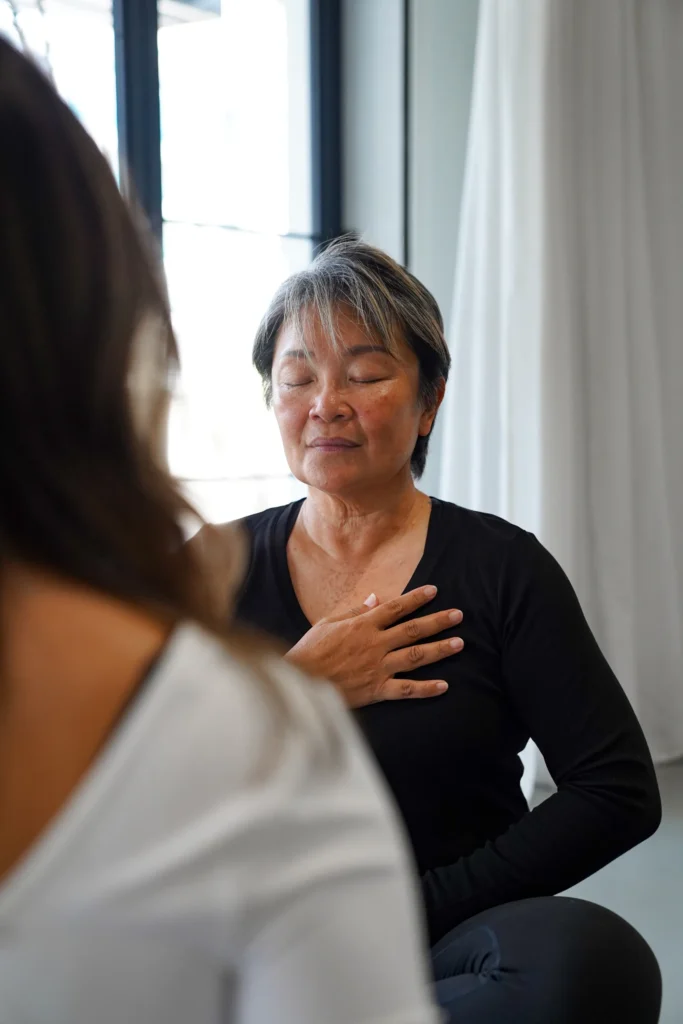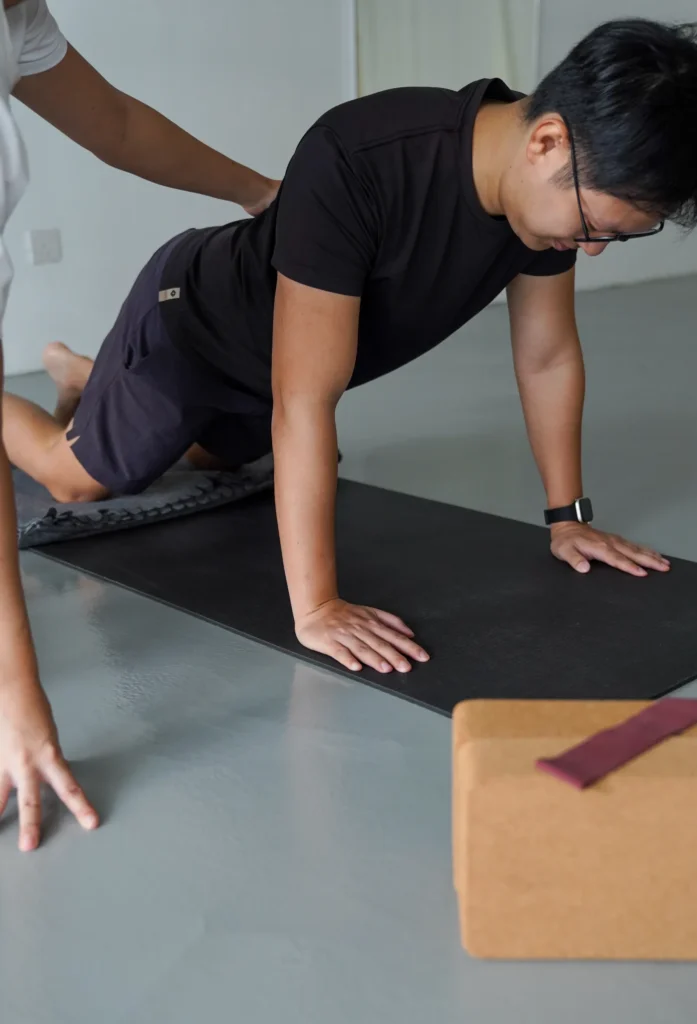Introduction
In this holistic exploration, we delve into the intersection of menopause and Yoga, uncovering the profound impact that Yoga can have on the journey through this natural phase of life. By understanding the physical, emotional, and hormonal shifts that accompany menopause, and harnessing the transformative power of yoga, menopausal individuals can not only navigate this transition with grace but also emerge stronger and more balanced. Let’s embark on this enlightening journey, embracing change and finding vitality through the practice of yoga.
The Menopausal Journey
A Natural Phase of Life
Menopause, a biological inevitability, marks the end of the female reproductive cycle. It is a transformative phase characterised by a decline in estrogen production, leading to a cessation of menstrual cycles. Understanding this as a natural progression is the first step towards embracing the changes that come with it.
Embracing the Change
Rather than viewing menopause as an endpoint, it’s an opportunity for renewal and self-discovery. Embracing the change involves recognising the wisdom that comes with age and accepting the newfound freedoms that this phase of life brings.
Physical and Emotional Shifts
Fluctuating hormone levels can result in a spectrum of physical and emotional shifts. These symptoms may leave menopausal individuals feeling uncomfortable, emotionally unstable, and lonely. It is important to understand that every menopausal journey is unique. Acknowledging and seeking support for symptoms of menopause as soon as they begin is paramount. The most commonly-known symptoms of menopause are:
- Hot flashes
- Night sweats
- Mood swings
- Changes in libido
- Irregular periods
- Vaginal dryness
- Sleep disturbances
- Weight gain
- Breast soreness
- Numbness (pins and needles)
- Headaches
- Changes in taste
- Burning sensation in the mouth
- Bloating
- Fatigue
- Joint pain
- Digestive changes
- Sharp or electric shocks
- Itchiness
- Muscle aches
- Brain fog and memory loss
- Concentration issues
- Brittle nails
- Thinning hair
- Incontinence and/or sudden urges to urinate
- Allergies
- Dizziness
- Irregular heartbeat
- Depression
- Irritability
- Body door
- Panic disorder
- Anxiety
- Osteoporosis
Yoga as a Menopausal Companion
Holistic Approach to Wellness
Yoga offers a holistic approach to wellness through a variety of practices that address the interconnectedness of the mind, body, and spirit. This integration aligns seamlessly with the transformative journey of menopause. Through mindful movement, breath awareness and meditation, menopausal individuals can cultivate a profound sense of self as well as the physical and mental resilience necessary to navigate the challenges of menopause with confidence.
Cultivating Inner Balance
Menopause often brings about a sense of internal imbalance. Mental health related symptoms can be deeply disturbing for the individuals that are experiencing them. With meditations and breathwork techniques, Yoga offers an array of tools that can help to manage these symptoms and improve overall mental wellness.
Easing Physical Discomfort
The stretching and mobility that is found in a Yoga practice, offers relief from the myriad of physical discomforts, such as joint pain, muscle stiffness, and reduced flexibility, that often accompany the journey into menopause.
Building Strength
The decline in estrogen production that happens during menopause, causes a loss of skeletal muscle mass and strength in menopausal bodies. This is known as Sarcopenia. To maintain strength and joint stability, strength training is recommended. Yoga offers a variety of exercises that preserve (and build) bone density and muscle mass.
Hormone Health
Studies suggest that the practice of yoga exerts a profound influence on the endocrine system, aiding in the regulation of hormones and mitigating the intensity of menopausal symptoms. Restorative postures in-specific offer nervous system regulation which improves the function of the endocrine glands, helping to regulate hormonal secretion and restore equilibrium within the body.
Nervous System Regulation
Beyond helping to regulate hormone secretion, Yoga engages the parasympathetic nervous system, which triggers the body’s relaxation response. This response is sometimes referred to as “rest-and-digest” as it is a state of calm that also initiates the body’s digestion and healing functions. This relaxed state alleviates symptoms of anxiety and counteracts the heightened stress response (which tends to exacerbate symptoms) that is often experienced during menopause.
Yoga for Menopause
Customising a yoga practice to suit the unique needs of menopause involves incorporating a balance of gentle and strength-building asanas as well as breathwork techniques and meditations for mental wellness.
Gentle Asanas for Comfort
During menopause when sleep quality may be diminished, restorative yoga offers a sanctuary of deep relaxation and rejuvenation. Through the support of props and extended holds, individuals can release tension, ease physical discomfort, and soothe their mind.
Reclined, supported heart-opening postures like Supta-Badha-Konasana (Reclining Bound Angle Pose) can re-energise the body and spirit, while poses like Balasana (Child’s Pose), and Setu Bandha Sarvangasana (supported Bridge Pose), offer relief from the physical discomforts associated with menopause. Postures that have a twisting element offer a gentle massage to the abdominal organs, which is helpful in supporting hormonal regulation and digestive health.
Finally, meditative poses like Savasana (Corpse Pose), which typically accompany the end of most Yoga classes, offer a moment of deep, meaningful rest. This can be especially impactful during the stages of menopause that leave many individuals feeling sleep-deprived and depleted.
Practices for Strength Building
The various bodyweight and core strengthening exercises found in a Yoga practice are essential for maintaining the integrity of the musculoskeletal structure. Postures like Folakasana (Plank Pose), which can be practiced with the knees grounded or elevated, build sustainable core and upper-body strength. Standing postures like Virabhadrasana Two (Warrior Two) improve leg strength for knee and ankle stability. And supine core strengthening exercises like “dead-bug” can help to maintain deep core awareness to maintain lumbar stability and deep core awareness.
Additionally, for menopausal individuals experiencing incontinence or sudden urges to urinate, adding pelvic floor strengthening exercises, such as Kegels, to the postures or breathwork exercises in their Yoga practice can be instrumental in regaining control in this area of the body.
Finally, as bone density declines during menopause, it might be recommended to develop a practice like Yin Yoga, which uses postures to apply gentle, long-held stress to bones and connective tissues. This gentle stressing of bones has been shown to increase the presence of osteoblasts which are the cells that grow and heal bone matter. As such, the practice of Yin can help improve bone health and density during menopause.
Breathwork to Relieve Stress
Pranayama, or breathwork, is a cornerstone of the practice of Yoga. Cultivating breath awareness has a naturally calming effect on the body. As such, breathing exercises can provide relief for anxiety, stress, and aid in emotional regulation.
Pranayama techniques can be practiced on their own or as an accompaniment to the Yoga postures. When integrated into the physical practice of Yoga, breathwork provides individuals with a steady place to anchor their focus during moments of physical challenge. This practice of breathing through discomfort cultivates emotional resilience.
On the other hand, calming breathwork techniques like Nadi Shodhana (alternate nostril breathing), and Bhramari (humming bee breath), offer a direct pathway to nervous system regulation and inner calm.
Meditation and Mindfulness
Meditation not only improves focus and clarity, but when combined with mindfulness practices, it equips menopausal individuals with tools to regain emotional equilibrium, fostering a centered and grounded foundation from which to navigate this phase.
Especially during periods of irritability, mindfulness meditations can offer a quiet, introspective respite for menopausal individuals to emotionally regulate amidst stress. As such, Individuals are better able to respond to stressful or irritating situations with calm presence of mind rather than reactivity.
Menopausal symptoms can also be disruptive for body image and self-esteem.Yoga is a practice that encourages self-acceptance and cultivates a positive self-image, holding space for menopausal individuals to embrace their changing bodies. Loving-kindness meditations and body-scan meditations also offer tools for cultivating self-awareness, inner peace and emotional resilience.
Community and Support
Moving with Others
Shared movement can be an incredible source of support and camaraderie during the journey of menopause. While most Yoga studios don’t offer menopause-specific groups classes, they often have private Yoga class offerings which could provide an opportunity for menopause awareness community gatherings. Moving through a menopause-friendly Yoga practice together, sharing experiences, and leaning on one another for advice generates solidarity in the menopausal journey.
Likewise, online Yoga communities that specialise in movement, fitness or Yoga during menopause, can also be a great way to connect with others who share similar experiences. Having a community to share your fitness journey with, especially during a time like menopause, can be both validating and empowering.
Seeking Guidance from Yoga Instructors
Experienced yoga instructors can offer modifications and specific practices that cater to the unique needs of menopause, creating a safe and empowering practice. A simple search (eg: “ Yoga for menopause near me ”, “ private yoga classes for menopause ”) can be helpful in locating experts in your local community. Because menopause is such a transformative moment, it is important to find a guide that you feel comfortable and empowered working with. Opting for a private Yoga class can be an invaluable experience to ensure that you receive a menopause-conscious Yoga practice that will honour your body’s needs.
Consulting Healthcare Providers
Before starting a new movement routine, it may be helpful to consult with your healthcare provider to ensure that Yoga is a suitable practice for your menopause journey. They will be able to offer expert guidance based on your unique medical history, and health requirements.
Yoga Beyond the Mat
Mindful Movement in Everyday Activities
Yoga is a practice of conscious, grounded movement. Practicing awareness and presence during everyday activities, whether it’s climbing stairs, driving, or routine tasks, is helpful for avoiding injury, improving focus, mastering memory, and generating mental clarity.
Incorporating Breathwork into Routine
Simple breath awareness exercises woven into daily activities provide moments of rejuvenation, allowing individuals in menopause to tap into their inner calm and reconnect deeply with their bodies. Breathing exercises can also be an invaluable tool to navigate the various moments of stress and challenge that arise during menopause, with resilience.
Practicing Self-Love
Yoga, at its core, is a practice that teaches individuals to honour their body. This principle is a guiding light in moments off the mat when feelings of body dysmorphia arise, when bodily changes (eg: the appearance bloating, wrinkles, grey hairs) feel unrecognisable, and when the physical changes of menopause feel frustrating. Yoga teaches individuals how to tap into gratitude, self-love and compassion.
Conclusion
In embracing the changes that menopause brings, menopausal individuals embark on a transformative journey, guided by the wisdom of yoga. This journey is not only about navigating physical shifts but about discovering a deeper sense of self, embracing life’s ebbs and flows, and finding a profound sense of well-being. Entering this new chapter, individuals in menopause do so with the knowledge that they are equipped to thrive, finding strength, balance, and vitality in every moment.




